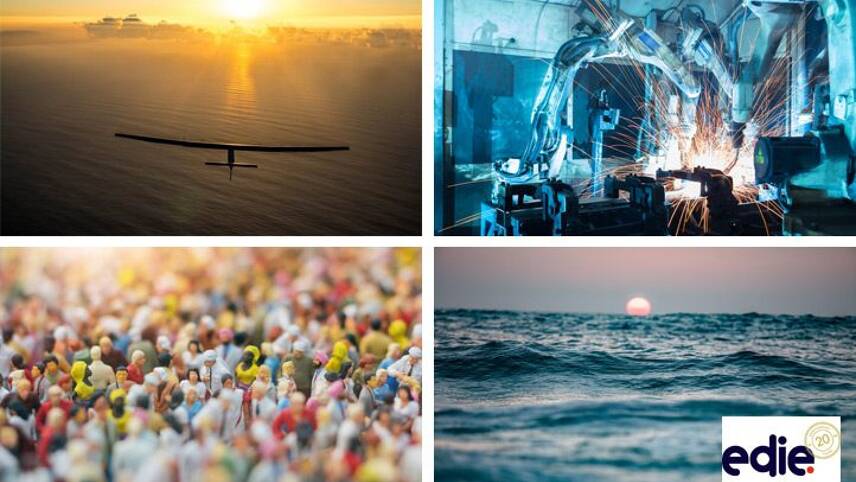Register for free and continue reading
Join our growing army of changemakers and get unlimited access to our premium content

Ten years ago, we launched Volans to bridge between the worlds of business incumbents and a new type of insurgent, social entrepreneurs. To kick things off, we got copies of our new book, The Power of Unreasonable People, into the hands of everyone attending the 2008 World Economic Forum annual summit in Davos.
Now, a decade on, it is clear that success often creates new problems. Look at what’s happening as our planet enters the Anthropocene epoch—where our species has planetary effects akin to geological forces. We have created successes beyond the wildest dreams of our great-grandparents, yet are now creating “wicked” problems—even so-called “superwicked” ones.
Think of our increasingly destabilised climate, forced migrations, vanishing species, the threat of more plastic than fish in the oceans … and that’s even before we get to the robots wanting our jobs.
So what do we do? Yes, we see the problems building, but too often we feel helpless. It’s as though we suffer from ‘locked-in syndrome’—conscious, but unable to move. Locked into a dysfunctional present, locked out of a better future.
Meanwhile, an old order is coming apart, new ones struggling to be born. But the worst of times can be the best of times for those wanting to drive fundamental, systemic change. If we can unlock tomorrow’s mindsets, we can solve most—perhaps all—of the wicked challenges we face.
Our Project Breakthrough work with the U.N. Global Compact has identified four keys to unlocking tomorrow’s mindsets—embracing imagination, system change, impact and scale.
1. Imagine Tomorrow Today
Our ability to imagine a better world is key to regenerating our cities, societies, economies and—ultimately—the biosphere. The good news, to paraphrase William Gibson, is that better futures are already here. They’re just not evenly distributed yet.
One solution, as with learning journeys, is to connect with—visit—those at the leading edges of change. Like matches struck the right way, learning minds can ignite others around them.
Our own ignition efforts have taken us from the worlds of social entrepreneurs and impact investors to those of city mayors and the exponential innovators of Silicon Valley. In the process, we have discovered that unlocking our imaginations involves getting out into the future more.
2. Clean Oceans, Not Just Fish
These are many awards for good corporate practice—and we celebrate people who put their greenest, cleanest and fairest feet forward. But burnishing the credentials of even the best companies in a world of unsustainability is like cleaning fish to swim in a dirty ocean.
It doesn’t work. Instead, a systemic crisis demands systemic solutions.
To create and drive systemic solutions, each of us must open our minds to new possibilities, relationships and business models. Business must open up to competitors, innovators, investors, policy makers and NGOs. And, crucially, we must better align incentives and institutions to drive deep change over time.
3. Value Your Impact
From the moment we are born, we have impact. Good, bad and, on occasion, ugly. Business must—indeed we all must—learn to speak the new language of impact.
For decades, experts tried to work out how to calculate and reduce the negative impacts made by business. Ozone holes, dead zones in river deltas, the growing drumbeat of climate-related disasters.
Then came the impact entrepreneurs and investors—making positive impacts for a living. Some people still struggle to adjust their mindsets, but there is a new generation of leaders and investors who truly “get” this. They know that tomorrow’s capitalism must shift from backing degeneration to investing in regeneration.
4. Dream Exponentially
These days incrementalism is not enough. We must learn to dream—and act—exponentially. From millions of empowered women entrepreneurs solving health problems to solar pilots winging around the world to demonstrate renewable energy, it’s already happening.
It’s time to dream bigger, better, bolder. To deliver solutions that are exponentially better, more affordable, more future-fit.
In this spirit, conducting the first-ever product recall for a management concept—the Triple Bottom Line, which I introduced back in 1994. In our 12-month Tomorrow’s Capitalism Inquiry, which launches in September, we plan to review progress over the past 25 years—and then look forward into the world of the late 2020s.
In the process, we plan to work out how to boost our own positive impact 10-fold (or 10X) through our second decade. And one think I suspect we will be proposing to a growing number of business leaders is that they carry out an “exponential audit” of their organisation.



Please login or Register to leave a comment.